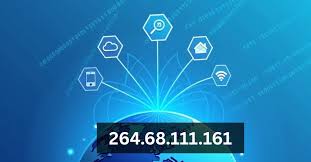Table of Contents
264.68.111.161: Indeed, in modern days with astounding advancements in technology, the internet has become a ubiquitous part of our lives. We use the internet for communication, banking, social media platforms, and even entertainment. Have you ever given a moment’s thought to what makes all of this work? IP addresses are timber dims in this network; they assist in device communication.
264.68.111.161 looks like just a random string of numbers, but knowing its context can be highly beneficial for your cyber security. Awareness of threats is as important as its prevention in today’s world. Cybersecurity experts need to keep updating themself with IP addresses and their risks.
What is an IP Address 264.68.111.161?

An IP address–also referred to as an Internet Protocol Address– acts as the distinguishing mark for every device linked to the Internet. It works similarly to a home address in that it enables packets of data to be sent to appropriate locations. The maximum amount of each section is also determined by 255, meaning there are trillions of potential combinations; however, this particular combination seems out of the ordinary because it surpasses the upper limits in average scenarios.
An IP address of this range (264.68.111.161) could belong to several routers or web servers, but could also indicate some kind of ongoing misconfiguration problem with a network device that needs deeper analysis and understanding.
The Importance of IP Addresses 264.68.111.161
IP addresses are essential in establishing a connection to the Internet. They help pinpoint each device in a given network for seamless system intercommunication. 264.68.111.161 has no difference and is essential in determining data transmission on the internet. A specific IP helps dramatically in aiding the routing procedures so that the right information is given to the specific destination it is supposed to reach, and requests and information are exchanged with no system delays.
Knowing this particular IP can give insight into many things, including user behaviors, their logged frequencies, or even their activities online within the particular range that has been assigned to them. Many businesses monitor such information to provide better services or even tailor their advertising campaigns. An IP address, for example, 264.68.111.161, can fetch precise information about the user’s location, which might pose issues concerning privacy for those users who are unaware of their digital traces.
In case of any other maleficent users knowing the importance of an IP address ensures protection towards the users online. Hence greatly enables people in minimizing their vulnerability exposure on the net.
Understanding the IP Address 264.68.111.161
Outwardly, the series of numbers in an IP Address 264.68.111.161 appears to be, hold meaning in the underbelly of the digital world. An IP Address acts as an identifier, for this case, an address, to a specific device. Meaning, it pairs an address with a phone number, which enables picking up and dropping off information at provided addresses. It is normally made out of four groups of numbers divided by dots. However, it is a different case with this example because every part must be within the range of 0-255.
IP Addresses form the foundation of online interactions such as being able to access a website or the privacy measures taken. In the case of conventional security exploits, one becomes security aware pertaining to 264.68.111.161 which tips one off to the possible dangers posed by the IP. This kind of informs steps to better defend private information while online.
Potential Security Risks for This IP 264.68.111.161
Just as in computer networking, when analyzing the possible security weaknesses associated with the IP address 264.68.111.161, the same should be reciprocated in the scanning from the cybercriminal side. Cybercriminals tend to scan large swaths of IPs searching for weaknesses they can exploit. 264.68.111.161 could be associated with some sort of phishing attempts or unauthorized access attempts. If devices connected to this IP address are not adequately protected, they may serve as gateways for malware to cause behavioral infection, as many cyberattacks are not the same. In addition, if 264.68.111.161 is on a shared network, the threats increase drastically since an attack on one device can affect the machines that are part of the same network.
Another concern would include sensitive information bonds wired to the web through multi-level routers bound to correlate with the given IP address, which could render users defenseless across different online engagements and financial activities. By comprehending these dangers, people and groups can enhance their defensive mechanisms, thereby enabling them to fortify their virtual territories against sweeps of threats that seem to always be lurking.
Steps to Protect Your Security
Protecting your accounts begins with creating complex passwords. Abandon easy combinations such as names and birthdays. Use a scrambled combination of upper and lowercase letters, numbers, and special characters instead. Updates to software need to be done regularly. Manual updating takes time, and so does ensuring that no recent exploit is active. Automatic updates, when available, should be turned on. Public Wi-Fi should be treated with a bit more caution.
When using a VPN, Wi-Fi connections become secure, but remember to limit the information that gets shared while connected to the network. Never trust public Wi-Fi connections. Emails and messages that appear to request personal details should be viewed with a suspicious gaze. Educate yourself on phishing scams. Malicious attempts tend to don a costume of legitimacy, so always proceed with apprehension.
The Role of Internet Service Providers (ISPs)
The managing of IP addresses such as 264.68.111.161 falls under the jurisdiction of Internet Service Providers (ISPs). ISPs grant these addresses to devices within their network, and, therefore, enable communication across the internet. Apart from that, ISPs keep track of the traffic and overall usage which may reveal some unusual activities related to certain IPs. Such monitoring helps protect users in different ways.
Additionally, ISPs have the responsibility of implementing protective measures against hacks and data theft related to certain IP addresses. Some of these may include firewalls and intrusion detection systems geared towards protecting MSIED customer connections. ISPs have to work together with cybersecurity firms, which is equally important. They develop new approaches for increasing online security and make users aware of how to use their IP addresses responsibly.
Conclusion
Online activities require knowledge of IP addresses ,for example, understanding concepts like 264.68.111.161. Each address is unique and identifies communication between devices connected to the internet. IP addresses can be important for digital security. Cybercriminals can exploit network weaknesses, turning an innocuous looking number into a threat. Being informed of such realities enables ideal means for vulnerability avoidance. The security concerns associated with an IP address are numerous, including data theft and unauthorized zone entry.
Users, as well as providers, hopeful in protecting sensitive data, need to meticulously strategize to render ideal protective methods alongside enhancing business cybersecurity frameworks. Users need to collaborate with them for comprehensive security solutions. Concern about wars based on computers stalks users. Moreover, users feel anxious about rapid changes in cybersecurity tactics, fostering an understanding that anything can be done by altering information in an IP address such as 264.68.111.161. Changing this bouldering culture begins with education.
